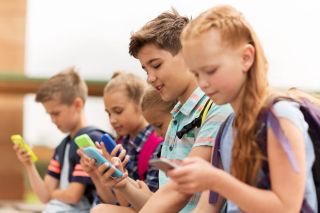If you are in the world of education and you haven’t heard the acronym “SEL,” you are probably in the minority. SEL stands for “Social-Emotional Learning,” the label given to the “soft skills” students need to be successful.
Skills like collaboration, self-awareness, self-regulation, and decision-making are all part of a broad category that is being looked at as essential for success beyond the classroom. Students today are coming to school with more trauma, more fears, more anxiety, and generally more needs than ever before. Learning how to cope with these challenges is vital, but many students still struggle with finding social-emotional balance.
There have been many theories about why social and emotional skills are not as strong as they could be. One theory is that as technology access grows, social and emotional skills decrease.
Authors like Dr. Jean Twenge lend credence to the idea that technology is to blame in the decrease of social and emotional skills. In her book, iGen: Why Today’s Super-Connected Kids are Growing Up Less Rebellious, More Tolerant, Less Happy--and Completely Unprepared for Adulthood, Dr. Twenge lays out the differences between previous generations and the one she has named “iGen” -- a term for students growing up after the infiltration of smart devices into society.
Dr. Twenge’s argument is that the immediate gratification and overwhelming amount of information available at our fingertips can become an obsession. If not used as the tool it is, a smart device has the ability to become extremely detrimental to social and emotional skills.
Technology is not blameless in the decrease of social-emotional skills. However, technology can also open up opportunities for social-emotional well-being. Here are just a few examples:
- Mindfulness and meditation apps are available on smart devices. What used to require an in-person guide can now be achieved from the comfort of your bedroom, opening up the benefits of self-awareness to thousands more than ever before.
- Google Forms and other similar collaborative tools can engage those students who are uncomfortable talking about problems, but are willing to write about them. The teacher can then have access to that information in real-time, the student has not embarrassed himself by speaking in front of the whole class, and follow-up can be done discreetly.
- Companies are designing user experiences for the education sector with SEL in mind. Beyond the companies that are creating mindfulness practices, all content area designers are looking for ways to integrate more “soft skills” into their programs.
- Virtual and augmented reality can be used to provide students with immersive experiences that can foster empathy. With this technology, students can visit other places and times, such as concentration camps to Cambodia, to understand the horrors of genocide that they would never experience without technology.
- There are endless opportunities to use Hangouts or similar virtual conference technology to expand learning and access to professionals, from school psychologists to AP teachers, to world languages.
The melding of SEL and technology has gone so far as to become a focus for ISTE sessions (Read Caitlin Krause’s article, “Social Emotional Learning Revolutionizes ISTE: Is “Edtech” Edging Toward Redundancy?” here https://www.techlearning.com/resources/social-emotional-learning) and other technology conferences.
As educators, we can help our students focus on the positive use of technology to support social emotional well-being. We can model for them what it looks like to have a disconnected conversation. We can allow them to use the tools available in their lives to improve their lives. And, we can guide them to know when enough is enough when it comes to their mental health around connected devices.
Nikki Schafer is an Instructional Technology Specialist in Omaha, Nebraska, where she lives with her husband, two little girls and two large dogs. Nikki has a bachelors in Music Education from the University of Nebraska at Lincoln, a Masters in Instructional Technology from the University of Nebraska at Kearney, and is currently working towards a Masters in Educational Leadership with Doane University.

